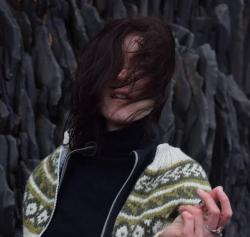
A spotlight falls on Siri Ranva Hjelm Jacobsen. She stands to read aloud a poem in the Fjósið cowshed. Moments later, Danish band Meejah kicks into their song “Lysgænger” which closes their soundbath as part of the Faroe Islands’ G! Festival literature program.
Co-curated by Kim Simonsen from Forlagið Eksil and Ida Bencke from the Laboratory for Aesthetics and Ecology, the literature program featured the theme ‘Always Coming Home.’ The week’s events included performances, interviews, lectures and video screenings by Faroese, Danish and Icelandic authors, held both in Tørshavn’s Nordic House and on-site at Gøta during the G! Festival.

Taegeuk and the I Ching
For the soundbath, Meejah collaborated with Faroese, Danish, and Icelandic poets. Their music-and-poetry set was formed around the Taegeuk (the original Korean flag) and the I Ching, which Meejah framed by saying, “When you live or play through it, you come home.” Each poet was requested to pen an original poem using the traditional Korean form of sijo, which has the constraints of 14-16 syllables per line, three lines, and development of a pastoral theme. The poets were further assigned one of eight elements depicted on the Korean flag: Fire ☲, Thunder ☳, Mountain ☶, Lake ☱, Water ☵, Earth ☷, Heaven ☰, and Wind ☴. The poems were then performed in between each song of Meejah’s set.
Regarding Meejah’s soundbath and her own contribution for wind, Siri reflects, “It was a beautiful way of bringing different artists together in a very egalitarian space. I really appreciated that people spoke in the languages they felt comfortable speaking in. Some translated, some spoke in native languages, some spoke in native languages and then translated. The fact that was left open made a beautiful tonal artwork.”
Home loss
The strong multilingual presence in the group of writers prompts songwriter and lead vocalist Mai Young Øvlisen to comment, “That’s why we are attracted to the literature programme. I integrated the Faroese language because everyone on the Faroe Islands, they need to learn Danish as part of their education. Even though it’s a country and a language, our neighbours, it’s a way of investing in another culture.”
Meejah is on the Faroese record label TUTL, and they are the first Danish band to write lyrics in Faroese. Mai first visited the Faroe Islands in 2003, and has been part of the music community ever since. She visits two or three times per year.
Mai continues, “The Faroese language is strong, the culture is strong, but that’s in spite of the Danish culture trying to dominate. On the Faroe Islands, when there is mist on the cow window, you just have to take your finger [and wipe to find] that pain of a few hundred years not being able to speak your language in public schools, churches, government. Because I’m Korean and adopted [into a Danish family], I can relate to that. The point of loss is a way that you can connect with other people. In the Korean culture, the concept of Han is the concept of loss, but that you live strongly because of the loss, with the loss. I think the Faroese people do that well.”

Given home
Siri was born in Copenhagen, but has travelled frequently to the Faroe Islands since she was a child to visit family on Suðuroy and Vágar. Her first novel ‘Ø’ (which translates from Danish as ‘Island’) rewrites ‘The Odyssey’ through the story of a young woman growing up in Denmark who doesn’t know her Faroese family. “She seeks out Faroese people in Copenhagen,” Siri explains, “and a Faroese guy at a bar says, ‘You can’t even pronounce your own name.’ Then she goes to the Faroe Islands in search of an answer to the question: How can you long for a home you’ve never been able to call your own?”
Siri continues, “Home is a place that you are given. My personal experience is that I am given home [in the Faroe Islands] on some very specific terms that have to do with name, blood, and history, but also that has to do with this culture’s idea of family and belonging. It’s closely connected to it being a diaspora culture. Half of the Faroese population lives abroad.”
Faroese diaspora
Considering discussion of the Faroese diaspora experience, Mai mentions her first encounter with Siri and her writing, which led to their subsequent collaboration through the soundbath. “It’s very similar to my experience as an adoptee. I lost my original name, family and language. Siri and I had a connection even before we met. I heard her on the radio.”
When Siri brought her novel ‘Ø’ to the Faroe Islands in 2016, she recalls, “I was extremely afraid of how I would be received. I shared that fear with the Faroese author Sissal Kampmann. She said, ‘Oh, no, everyone has a granddaughter like you. Every single Faroese family has somebody that has left and that is, in fact, always coming home.’ But it is important in the political sense to maintain that home is given. That is a key element in the conversation about who gets to be home and who doesn’t.”

G! Festival took place in The Faroe Islands July 12-14th. Click here to read more. To read more about literature in Iceland, click here.
Buy subscriptions, t-shirts and more from our shop right here!

















